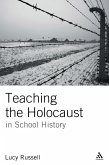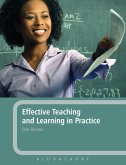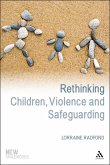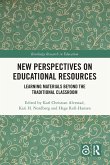Perspectives on Educational Practice Around the World
Herausgeber: Hammond, Sue; Sangster, Margaret
Perspectives on Educational Practice Around the World
Herausgeber: Hammond, Sue; Sangster, Margaret
- Broschiertes Buch
- Merkliste
- Auf die Merkliste
- Bewerten Bewerten
- Teilen
- Produkt teilen
- Produkterinnerung
- Produkterinnerung
This book explores the philosophies, barriers and opportunities shaping education environments for children, teachers and student teachers in diverse countries around the world through a series of pertinent articles. These are drawn from the contributors' experiential knowledge of education in contexts such as Australia, Canada, China, Finland, India, Nepal, Palestine, Qatar, South Africa, the UK and Venezuela. The issues raised enable valuable insights into formal education from pre-school to higher education within individual national contexts, while also having significance across state…mehr
Andere Kunden interessierten sich auch für
![Teaching the Holocaust in School History Teaching the Holocaust in School History]() Lucy RussellTeaching the Holocaust in School History47,99 €
Lucy RussellTeaching the Holocaust in School History47,99 €![Effective Teaching and Learning in Practice Effective Teaching and Learning in Practice]() Don SkinnerEffective Teaching and Learning in Practice40,99 €
Don SkinnerEffective Teaching and Learning in Practice40,99 €![Rethinking Children, Violence and Safeguarding Rethinking Children, Violence and Safeguarding]() Lorraine RadfordRethinking Children, Violence and Safeguarding33,99 €
Lorraine RadfordRethinking Children, Violence and Safeguarding33,99 €![The History of Ancient Education: An Account of the Course of Educational Opinion and Practice The History of Ancient Education: An Account of the Course of Educational Opinion and Practice]() Samuel Gardner WilliamsThe History of Ancient Education: An Account of the Course of Educational Opinion and Practice21,99 €
Samuel Gardner WilliamsThe History of Ancient Education: An Account of the Course of Educational Opinion and Practice21,99 €![New Perspectives on Educational Resources New Perspectives on Educational Resources]() New Perspectives on Educational Resources54,99 €
New Perspectives on Educational Resources54,99 €![The Educational Ideas of Froebel The Educational Ideas of Froebel]() Jessie WhiteThe Educational Ideas of Froebel18,99 €
Jessie WhiteThe Educational Ideas of Froebel18,99 €![The Outlines of Educational Psychology, an Introduction to the Science of Education The Outlines of Educational Psychology, an Introduction to the Science of Education]() William Henry PyleThe Outlines of Educational Psychology, an Introduction to the Science of Education22,99 €
William Henry PyleThe Outlines of Educational Psychology, an Introduction to the Science of Education22,99 €-
-
-
This book explores the philosophies, barriers and opportunities shaping education environments for children, teachers and student teachers in diverse countries around the world through a series of pertinent articles. These are drawn from the contributors' experiential knowledge of education in contexts such as Australia, Canada, China, Finland, India, Nepal, Palestine, Qatar, South Africa, the UK and Venezuela. The issues raised enable valuable insights into formal education from pre-school to higher education within individual national contexts, while also having significance across state boundaries. They are set against a background of international comparisons, global economies and communications, and environmental and social change. The topics covered include global citizenship, learning environments, inclusion and inequality. Each of the articles introduces a key issue, offers contextualized examples and questions to prompt discussion and further research, along with a guide to further resources. Thoughtfully structured, the editors provide an overarching introduction and concluding chapter, reflecting on global issues and directions of travel in educational policies as well as highlighting countries which are bucking current trends. They also include a short introduction to each part, drawing together chapters and challenging thinking.
Produktdetails
- Produktdetails
- Bloomsbury 3PL
- Verlag: Bloomsbury Publishing PLC
- Seitenzahl: 232
- Erscheinungstermin: 30. Mai 2019
- Englisch
- Abmessung: 234mm x 156mm x 12mm
- Gewicht: 332g
- ISBN-13: 9781350076334
- ISBN-10: 1350076333
- Artikelnr.: 54613242
- Herstellerkennzeichnung
- Libri GmbH
- Europaallee 1
- 36244 Bad Hersfeld
- gpsr@libri.de
- Bloomsbury 3PL
- Verlag: Bloomsbury Publishing PLC
- Seitenzahl: 232
- Erscheinungstermin: 30. Mai 2019
- Englisch
- Abmessung: 234mm x 156mm x 12mm
- Gewicht: 332g
- ISBN-13: 9781350076334
- ISBN-10: 1350076333
- Artikelnr.: 54613242
- Herstellerkennzeichnung
- Libri GmbH
- Europaallee 1
- 36244 Bad Hersfeld
- gpsr@libri.de
Sue Hammond is Senior Lecturer in Primary Education at Canterbury Christ Church University, UK. As a primary school teacher, Sue was committed to developing children's talents, interests and learning. Through her role in teacher education, she works closely with schools, extending her research into social diversity. Sue was a consultant in Malaysia and India and has taught teachers and students from across the globe. Margaret Sangster was formerly Principal Lecturer in Primary Education at Canterbury Christ Church University, UK. Margaret worked as an advisor to primary and middle schools, was a Principal Lecturer in Primary Mathematics, and held managerial positions in higher education. She acted as a mathematics consultant in Malaysia.
Notes on Contributors
Preface
Introduction
Part I: A View from the Inside
1.What is the Purpose of Education in a Country Infected by Poverty and
Corruption? Andrea Ramos Arias (Canterbury Christ Church University, UK)
2.How Practical is it to Implement National Standards in an International
Setting? (Primary School Teacher, Qatar)
3.An Imperial Relic or Preparation for a Global Society? What are the
Issues of Having English-medium Schools? Simon Hoult (Canterbury Christ
Church University, UK) and Christudas Amala Lal (University of Kerala,
India)
4.Who Decides What Should Be Taught in Our Schools and Why? Yvonne S.
Findlay (University of Southern Queensland, Australia)
5.What Are the Effects of Changing Curriculums? Mas Norbany binti Abu Samah
(IPG Kampus Dato' Razali Ismail, Malaysia)
6.Are There Strategies that Provide Successful Inclusion for All Students
in General Education? Ellen Warrington (Mount Mercy University, USA)
7.Can Diversity Really Be Used in Minority Language Teaching? Lynne Wiltse
(University of Alberta, Canada)
8.How Can Inclusion be Promoted Through a Linguistically Responsive
Pedagogy? (Jenni Alisaari (University of Turku, Finland), Heli Vigren
(University of Turku, Finland) and Leena Maria Heikkola (University of
Oslo, Norway)
9.How Much Does Teacher Enthusiasm Affect Student Learning? Maria Mifsud
(University of Malta, Malta)
10.What Social Justice is Being Achieved Through Education? Sue Hammond
(Canterbury Christ Church University, UK)
11.What Pedagogical Questions Are Raised in Reforming Early Literacy
Instruction? Mona Flognfeldt (Oslo and Akershus University College of
Applied Sciences, Norway), Eva Michaelsen (Oslo and Akershus University
College of Applied Sciences, Norway) and Kirsten Palm (Oslo and Akershus
University College of Applied Sciences, Norway)
12.Does Collaborative Teaching Work? Tika Ram Pokhrel (Kathmandu
University, Nepal)
13.How Can We Learn from Teaching in Another Country? Alison Leonard
(Canterbury Christ Church University, UK)
14.How Can Visually Impaired Children Be Supported? Baraka Mwiyoha (DCT
Mvumi Secondary School, Tanzania) and Alison Leonard (Canterbury Christ
Church University, UK)
15.How Do Theory and Practice Relate to Each Other in the Social Reality of
the Classroom? Vuyokazi Nomlomo (University of Western Cape, South Africa)
and Melanie Luckay (University of Western Cape, South Africa)
Part II: A View from the Outside Looking in
16.What Can We Learn from Two Contrasting Cultural Educational Traditions?
Vanessa Young (Canterbury Christ Church University, UK)
17.How Could This Be? Hilde Tørnby (Oslo and Akershus University College of
Applied Sciences, Norway)
18.How Can You Build Well-being in a Culturally Different Context? Karen
Collett, (University of Western Cape, South Africa)
19.How Can International Exchange Programmes Support Teacher Development?
Sissel Tove Olsen (Oslo and Akershus University College of Applied
Sciences, Norway)
20.How Might Teachers Adapt Their Practice in Response to Traumatized
Students? Jill Matthews (Canterbury Christ Church University, UK)
21.What Do Children Think about Other Nations, Peoples and Cultures?
Stephen Scoffham (Canterbury Christ Church University, UK)
Part III: A Meeting of Minds
22.How Do We Prepare Teachers as Global Educators and Balance National
Accreditation Requirements With Global Challenges? Oliver McGarr
(University of Limerick, Ireland)
23.How Does Prescribed Curriculum Content Impact on Inclusive Education
Practices in Emerging Educational Systems? Viv Wilson (Canterbury Christ
Church University, UK) and Mirna Nel (North Western University, South
Africa)
24.What Are the Challenges for Teachers of Implementing Curriculum Change?
Hanan Jibril-Dadoub (National Institute for Educational Training, Ministry
of Education and Higher Education, Palestine), Maria Elsam (Canterbury
Christ Church University, UK) and Joy Mower (Canterbury Christ Church
University, UK)
25.What Can Be Gained from Intercultural Engagements? Christudas Amala Lal
(University of Kerala, India) and Simon Hoult (Canterbury Christ Church
University, UK)
26.How Might Experience Another Culture Challenge Assumptions? Clair
Stevens (Canterbury Christ Church University, UK) and Sue Hammond
(Canterbury Christ Church University, UK)
27.How Can We Learn to Live within Planetary Limits? Stephen Scoffham
(Canterbury Christ Church University, UK) with Margaret Sangster
(Canterbury Christ Church University, UK)
28.A Perspective on the Perspectives (Sue Hammond, (Canterbury Christ
Church University, UK)
References
Index
Preface
Introduction
Part I: A View from the Inside
1.What is the Purpose of Education in a Country Infected by Poverty and
Corruption? Andrea Ramos Arias (Canterbury Christ Church University, UK)
2.How Practical is it to Implement National Standards in an International
Setting? (Primary School Teacher, Qatar)
3.An Imperial Relic or Preparation for a Global Society? What are the
Issues of Having English-medium Schools? Simon Hoult (Canterbury Christ
Church University, UK) and Christudas Amala Lal (University of Kerala,
India)
4.Who Decides What Should Be Taught in Our Schools and Why? Yvonne S.
Findlay (University of Southern Queensland, Australia)
5.What Are the Effects of Changing Curriculums? Mas Norbany binti Abu Samah
(IPG Kampus Dato' Razali Ismail, Malaysia)
6.Are There Strategies that Provide Successful Inclusion for All Students
in General Education? Ellen Warrington (Mount Mercy University, USA)
7.Can Diversity Really Be Used in Minority Language Teaching? Lynne Wiltse
(University of Alberta, Canada)
8.How Can Inclusion be Promoted Through a Linguistically Responsive
Pedagogy? (Jenni Alisaari (University of Turku, Finland), Heli Vigren
(University of Turku, Finland) and Leena Maria Heikkola (University of
Oslo, Norway)
9.How Much Does Teacher Enthusiasm Affect Student Learning? Maria Mifsud
(University of Malta, Malta)
10.What Social Justice is Being Achieved Through Education? Sue Hammond
(Canterbury Christ Church University, UK)
11.What Pedagogical Questions Are Raised in Reforming Early Literacy
Instruction? Mona Flognfeldt (Oslo and Akershus University College of
Applied Sciences, Norway), Eva Michaelsen (Oslo and Akershus University
College of Applied Sciences, Norway) and Kirsten Palm (Oslo and Akershus
University College of Applied Sciences, Norway)
12.Does Collaborative Teaching Work? Tika Ram Pokhrel (Kathmandu
University, Nepal)
13.How Can We Learn from Teaching in Another Country? Alison Leonard
(Canterbury Christ Church University, UK)
14.How Can Visually Impaired Children Be Supported? Baraka Mwiyoha (DCT
Mvumi Secondary School, Tanzania) and Alison Leonard (Canterbury Christ
Church University, UK)
15.How Do Theory and Practice Relate to Each Other in the Social Reality of
the Classroom? Vuyokazi Nomlomo (University of Western Cape, South Africa)
and Melanie Luckay (University of Western Cape, South Africa)
Part II: A View from the Outside Looking in
16.What Can We Learn from Two Contrasting Cultural Educational Traditions?
Vanessa Young (Canterbury Christ Church University, UK)
17.How Could This Be? Hilde Tørnby (Oslo and Akershus University College of
Applied Sciences, Norway)
18.How Can You Build Well-being in a Culturally Different Context? Karen
Collett, (University of Western Cape, South Africa)
19.How Can International Exchange Programmes Support Teacher Development?
Sissel Tove Olsen (Oslo and Akershus University College of Applied
Sciences, Norway)
20.How Might Teachers Adapt Their Practice in Response to Traumatized
Students? Jill Matthews (Canterbury Christ Church University, UK)
21.What Do Children Think about Other Nations, Peoples and Cultures?
Stephen Scoffham (Canterbury Christ Church University, UK)
Part III: A Meeting of Minds
22.How Do We Prepare Teachers as Global Educators and Balance National
Accreditation Requirements With Global Challenges? Oliver McGarr
(University of Limerick, Ireland)
23.How Does Prescribed Curriculum Content Impact on Inclusive Education
Practices in Emerging Educational Systems? Viv Wilson (Canterbury Christ
Church University, UK) and Mirna Nel (North Western University, South
Africa)
24.What Are the Challenges for Teachers of Implementing Curriculum Change?
Hanan Jibril-Dadoub (National Institute for Educational Training, Ministry
of Education and Higher Education, Palestine), Maria Elsam (Canterbury
Christ Church University, UK) and Joy Mower (Canterbury Christ Church
University, UK)
25.What Can Be Gained from Intercultural Engagements? Christudas Amala Lal
(University of Kerala, India) and Simon Hoult (Canterbury Christ Church
University, UK)
26.How Might Experience Another Culture Challenge Assumptions? Clair
Stevens (Canterbury Christ Church University, UK) and Sue Hammond
(Canterbury Christ Church University, UK)
27.How Can We Learn to Live within Planetary Limits? Stephen Scoffham
(Canterbury Christ Church University, UK) with Margaret Sangster
(Canterbury Christ Church University, UK)
28.A Perspective on the Perspectives (Sue Hammond, (Canterbury Christ
Church University, UK)
References
Index
Notes on Contributors
Preface
Introduction
Part I: A View from the Inside
1.What is the Purpose of Education in a Country Infected by Poverty and
Corruption? Andrea Ramos Arias (Canterbury Christ Church University, UK)
2.How Practical is it to Implement National Standards in an International
Setting? (Primary School Teacher, Qatar)
3.An Imperial Relic or Preparation for a Global Society? What are the
Issues of Having English-medium Schools? Simon Hoult (Canterbury Christ
Church University, UK) and Christudas Amala Lal (University of Kerala,
India)
4.Who Decides What Should Be Taught in Our Schools and Why? Yvonne S.
Findlay (University of Southern Queensland, Australia)
5.What Are the Effects of Changing Curriculums? Mas Norbany binti Abu Samah
(IPG Kampus Dato' Razali Ismail, Malaysia)
6.Are There Strategies that Provide Successful Inclusion for All Students
in General Education? Ellen Warrington (Mount Mercy University, USA)
7.Can Diversity Really Be Used in Minority Language Teaching? Lynne Wiltse
(University of Alberta, Canada)
8.How Can Inclusion be Promoted Through a Linguistically Responsive
Pedagogy? (Jenni Alisaari (University of Turku, Finland), Heli Vigren
(University of Turku, Finland) and Leena Maria Heikkola (University of
Oslo, Norway)
9.How Much Does Teacher Enthusiasm Affect Student Learning? Maria Mifsud
(University of Malta, Malta)
10.What Social Justice is Being Achieved Through Education? Sue Hammond
(Canterbury Christ Church University, UK)
11.What Pedagogical Questions Are Raised in Reforming Early Literacy
Instruction? Mona Flognfeldt (Oslo and Akershus University College of
Applied Sciences, Norway), Eva Michaelsen (Oslo and Akershus University
College of Applied Sciences, Norway) and Kirsten Palm (Oslo and Akershus
University College of Applied Sciences, Norway)
12.Does Collaborative Teaching Work? Tika Ram Pokhrel (Kathmandu
University, Nepal)
13.How Can We Learn from Teaching in Another Country? Alison Leonard
(Canterbury Christ Church University, UK)
14.How Can Visually Impaired Children Be Supported? Baraka Mwiyoha (DCT
Mvumi Secondary School, Tanzania) and Alison Leonard (Canterbury Christ
Church University, UK)
15.How Do Theory and Practice Relate to Each Other in the Social Reality of
the Classroom? Vuyokazi Nomlomo (University of Western Cape, South Africa)
and Melanie Luckay (University of Western Cape, South Africa)
Part II: A View from the Outside Looking in
16.What Can We Learn from Two Contrasting Cultural Educational Traditions?
Vanessa Young (Canterbury Christ Church University, UK)
17.How Could This Be? Hilde Tørnby (Oslo and Akershus University College of
Applied Sciences, Norway)
18.How Can You Build Well-being in a Culturally Different Context? Karen
Collett, (University of Western Cape, South Africa)
19.How Can International Exchange Programmes Support Teacher Development?
Sissel Tove Olsen (Oslo and Akershus University College of Applied
Sciences, Norway)
20.How Might Teachers Adapt Their Practice in Response to Traumatized
Students? Jill Matthews (Canterbury Christ Church University, UK)
21.What Do Children Think about Other Nations, Peoples and Cultures?
Stephen Scoffham (Canterbury Christ Church University, UK)
Part III: A Meeting of Minds
22.How Do We Prepare Teachers as Global Educators and Balance National
Accreditation Requirements With Global Challenges? Oliver McGarr
(University of Limerick, Ireland)
23.How Does Prescribed Curriculum Content Impact on Inclusive Education
Practices in Emerging Educational Systems? Viv Wilson (Canterbury Christ
Church University, UK) and Mirna Nel (North Western University, South
Africa)
24.What Are the Challenges for Teachers of Implementing Curriculum Change?
Hanan Jibril-Dadoub (National Institute for Educational Training, Ministry
of Education and Higher Education, Palestine), Maria Elsam (Canterbury
Christ Church University, UK) and Joy Mower (Canterbury Christ Church
University, UK)
25.What Can Be Gained from Intercultural Engagements? Christudas Amala Lal
(University of Kerala, India) and Simon Hoult (Canterbury Christ Church
University, UK)
26.How Might Experience Another Culture Challenge Assumptions? Clair
Stevens (Canterbury Christ Church University, UK) and Sue Hammond
(Canterbury Christ Church University, UK)
27.How Can We Learn to Live within Planetary Limits? Stephen Scoffham
(Canterbury Christ Church University, UK) with Margaret Sangster
(Canterbury Christ Church University, UK)
28.A Perspective on the Perspectives (Sue Hammond, (Canterbury Christ
Church University, UK)
References
Index
Preface
Introduction
Part I: A View from the Inside
1.What is the Purpose of Education in a Country Infected by Poverty and
Corruption? Andrea Ramos Arias (Canterbury Christ Church University, UK)
2.How Practical is it to Implement National Standards in an International
Setting? (Primary School Teacher, Qatar)
3.An Imperial Relic or Preparation for a Global Society? What are the
Issues of Having English-medium Schools? Simon Hoult (Canterbury Christ
Church University, UK) and Christudas Amala Lal (University of Kerala,
India)
4.Who Decides What Should Be Taught in Our Schools and Why? Yvonne S.
Findlay (University of Southern Queensland, Australia)
5.What Are the Effects of Changing Curriculums? Mas Norbany binti Abu Samah
(IPG Kampus Dato' Razali Ismail, Malaysia)
6.Are There Strategies that Provide Successful Inclusion for All Students
in General Education? Ellen Warrington (Mount Mercy University, USA)
7.Can Diversity Really Be Used in Minority Language Teaching? Lynne Wiltse
(University of Alberta, Canada)
8.How Can Inclusion be Promoted Through a Linguistically Responsive
Pedagogy? (Jenni Alisaari (University of Turku, Finland), Heli Vigren
(University of Turku, Finland) and Leena Maria Heikkola (University of
Oslo, Norway)
9.How Much Does Teacher Enthusiasm Affect Student Learning? Maria Mifsud
(University of Malta, Malta)
10.What Social Justice is Being Achieved Through Education? Sue Hammond
(Canterbury Christ Church University, UK)
11.What Pedagogical Questions Are Raised in Reforming Early Literacy
Instruction? Mona Flognfeldt (Oslo and Akershus University College of
Applied Sciences, Norway), Eva Michaelsen (Oslo and Akershus University
College of Applied Sciences, Norway) and Kirsten Palm (Oslo and Akershus
University College of Applied Sciences, Norway)
12.Does Collaborative Teaching Work? Tika Ram Pokhrel (Kathmandu
University, Nepal)
13.How Can We Learn from Teaching in Another Country? Alison Leonard
(Canterbury Christ Church University, UK)
14.How Can Visually Impaired Children Be Supported? Baraka Mwiyoha (DCT
Mvumi Secondary School, Tanzania) and Alison Leonard (Canterbury Christ
Church University, UK)
15.How Do Theory and Practice Relate to Each Other in the Social Reality of
the Classroom? Vuyokazi Nomlomo (University of Western Cape, South Africa)
and Melanie Luckay (University of Western Cape, South Africa)
Part II: A View from the Outside Looking in
16.What Can We Learn from Two Contrasting Cultural Educational Traditions?
Vanessa Young (Canterbury Christ Church University, UK)
17.How Could This Be? Hilde Tørnby (Oslo and Akershus University College of
Applied Sciences, Norway)
18.How Can You Build Well-being in a Culturally Different Context? Karen
Collett, (University of Western Cape, South Africa)
19.How Can International Exchange Programmes Support Teacher Development?
Sissel Tove Olsen (Oslo and Akershus University College of Applied
Sciences, Norway)
20.How Might Teachers Adapt Their Practice in Response to Traumatized
Students? Jill Matthews (Canterbury Christ Church University, UK)
21.What Do Children Think about Other Nations, Peoples and Cultures?
Stephen Scoffham (Canterbury Christ Church University, UK)
Part III: A Meeting of Minds
22.How Do We Prepare Teachers as Global Educators and Balance National
Accreditation Requirements With Global Challenges? Oliver McGarr
(University of Limerick, Ireland)
23.How Does Prescribed Curriculum Content Impact on Inclusive Education
Practices in Emerging Educational Systems? Viv Wilson (Canterbury Christ
Church University, UK) and Mirna Nel (North Western University, South
Africa)
24.What Are the Challenges for Teachers of Implementing Curriculum Change?
Hanan Jibril-Dadoub (National Institute for Educational Training, Ministry
of Education and Higher Education, Palestine), Maria Elsam (Canterbury
Christ Church University, UK) and Joy Mower (Canterbury Christ Church
University, UK)
25.What Can Be Gained from Intercultural Engagements? Christudas Amala Lal
(University of Kerala, India) and Simon Hoult (Canterbury Christ Church
University, UK)
26.How Might Experience Another Culture Challenge Assumptions? Clair
Stevens (Canterbury Christ Church University, UK) and Sue Hammond
(Canterbury Christ Church University, UK)
27.How Can We Learn to Live within Planetary Limits? Stephen Scoffham
(Canterbury Christ Church University, UK) with Margaret Sangster
(Canterbury Christ Church University, UK)
28.A Perspective on the Perspectives (Sue Hammond, (Canterbury Christ
Church University, UK)
References
Index


